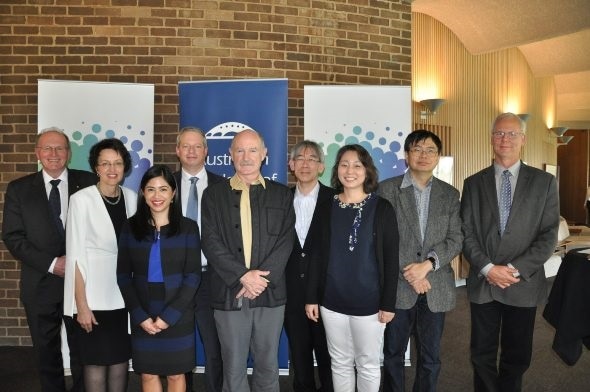Dec 13 2017
A declaration to establish an International Brain Initiative has been made by representatives from some of the world’s major brain research projects, including the Human Brain Project.

Representatives of the initial projects that signed the 'Canberra Declaration". L-R: Prof Andrew Holmes, Prof Linda Richards (Australian Brain Alliance), Dr Caroline Montojo (The Kavli Foundation), Christoph Ebell (Human Brain Project), Prof Rafael Yuste (BRAIN Initiative), Prof Shigeo Okabe (Brain/MINDS project Japan), Prof Sung-Jin Jeong (Korea Brain Initiative), Prof Hideyuki Okano (Brain/MINDS project Japan) and Dr James Deshler (BRAIN Initiative).
At the Australian Academy of Science in Canberra, representatives from Japan, Korea, Europe, the United States of America and Australia announced a formal declaration to work together to speed up progress on ‘cracking the brain’s code’.
The declaration reads: “Researchers working on brain initiatives from around the world recognize that they are engaged in an effort so large and complex that even with the unprecedented efforts and resources from public and private enterprise, no single initiative will be able to tackle the challenge to understand the brain.” (See below for the full declaration).
Human Brain Project executive director Chris Ebell said the ‘Canberra declaration’ recognized that no single project will be able provide the full picture. The extent of the challenge to measure, map, image, model, simulate, understand, imitate, diagnose and heal the brain requires worldwide research efforts to join forces.
“This really is a chance to step-up to another level of interdisciplinary, international scientific research and deliver results that will profoundly impact our collective societies,” he said.
President of the Australian Academy of Science, Professor Andrew Holmes said the announcement of the International Brain Initiative was the most exciting day of his presidency to date.
“It takes real commitment, real initiative, real drive and real talent, to achieve what we have achieved with this commitment. This is how science should be done”.
Human Brain Project Scientific Director Katrin Amunts said unlocking the complexity of the brain was one of the great challenges of our time.
“To be able to share knowledge, to be able to work together, to ask and answer questions collectively is extremely exciting and promising. To understand the complexity of the brain requires the greatest cooperation possible,” she said.
President-elect of the European Brain Council Professor Monica di Luca welcomed the International Brain Initiative as the next step in deepening our ability to understand the brain.
“It is extremely timely and relevant to achieve a better coordination of the various brain initiatives worldwide not only to raise awareness of scientific results but also to share common goals. Europe already moved forward to align all efforts in the area of brain research at large through the EBC and is now ready to bring this collaboration to the next step.”
The initial members of the International Brain Initiative are:
Australian Brain Alliance
Brain/MINDS project Japan Korea Brain Initiative
Human Brain Project
BRAIN Initiative
Brain research initiatives from other countries and regions are also invited to join the International Brain Initiative.
The first meeting of the International Brain Initiative steering committee will be held in January 2018.
Source: http://www.humanbrainproject.eu/en/follow-hbp/news/worlds-brain-initiatives-move-forward-together/